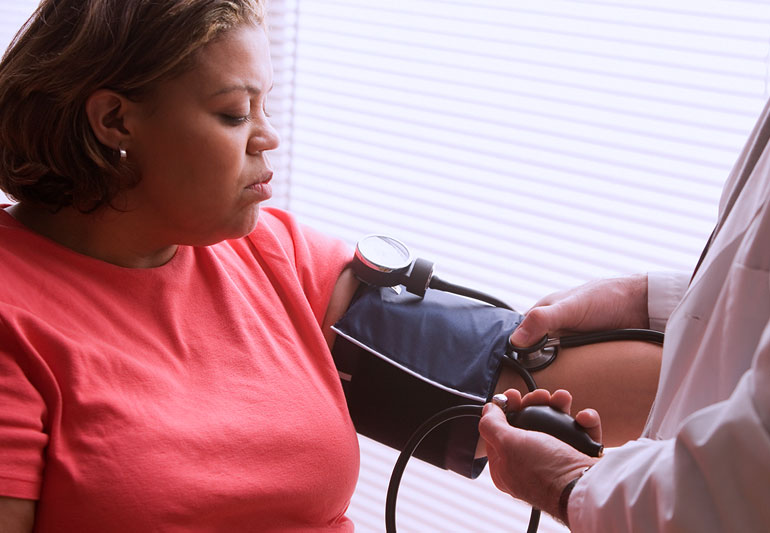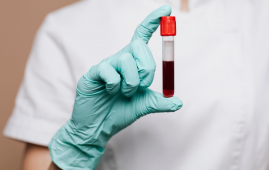

If your blood pressure has crept up over the years, you likely take one or more drugs to help bring it down. But what happens when medication isn’t enough to control your hypertension?
Although high blood pressure is often treated successfully with medication and lifestyle changes, resistant hypertension is not so easy to address. Hypertension specialist George Thomas, MD, helps unpack this common cardiovascular disease.
What is resistant hypertension?
High blood pressure is sometimes known as “the silent killer” — so named because it increases the risk of heart attack and stroke, but often goes unnoticed because of its lack of obvious symptoms of high blood pressure. In fact, you may have high blood pressure and not even know it.
But resistant hypertension, just as the name says, is when your high blood pressure is difficult to control even with medication.
“Resistant hypertension is the failure to reach your goal blood pressure when you’re adhering to maximally tolerated doses of an appropriate three-drug regimen that includes a diuretic,” explains Dr. Thomas.
Put another way: If you have high blood pressure, and you’re taking the maximum dose of three different blood pressure medications including a water pill (diuretic), and your blood pressure still isn’t at safe levels, you may have resistant hypertension. And you’ll need to do more to control it.
Confirming this diagnosis
Diagnosing resistant hypertension isn’t always simple. Getting a consistently accurate reading is key, and Dr. Thomas says, sometimes that’s tricky.
There are several reasons why you might get an inaccurate reading. This can happen if:
- The blood pressure cuff is too small.
- You haven’t rested long enough before checking blood pressure.
- You experience “white coat hypertension,” or elevated blood pressure due to anxiety in the doctor’s office.
- You smoke or have caffeine right before having your blood pressure taken as this can artificially inflate the numbers.
If you rule out all of those factors, and your blood pressure is still elevated, your may have resistant hypertension.
What’s causing it? In many cases, it’s a matter of lifestyle, Dr. Thomas says. Medication can only do so much to control your blood pressure.
Your doctor likely will explore four possibilities:
1. If you’re eating a diet that’s high in sodium, smoking, consuming a lot of alcohol, or are overweight and not exercising, your medication may not overcome those behaviors.
2. Medications you take for other things can contribute to the problem. NSAIDS (non-steroidal anti-inflammatory drugs, such as ibuprofen), oral contraceptives and nasal decongestants all can boost your blood pressure, Dr. Thomas says.
“Be sure to bring all of your pill bottles, including over-the-counter medications or herbal supplements or vitamins, to your medical appointments,” he says.
3. There’s also evidence that obstructive sleep apnea can contribute to resistant hypertension. Your doctor may order a sleep study if this is a concern.
4. If your doctor rules out lifestyle factors and medications, he or she may look for other causes related to hormones or vascular problems.
Steps you can take to overcome resistant hypertension
Dr. Thomas offers eight tips for managing hypertension. If you do these things, you’ll know you’re doing all you can to help:
1. Make sure you’re taking your hypertension medication correctly and at the scheduled time.
2. If your medication is causing unpleasant side effects, talk to your doctor about alternatives — don’t just stop taking it.
Follow a low-sodium diet (less than 2.3 grams per day).
3. Follow the DASH diet, which includes lots of fruits, vegetables, whole grains and lean protein.
4. Exercise regularly — but talk to your doctor first if it’s been awhile since you were physically active.
5. Easing into an exercise program slowly can be your best bet.
6. Limit the amount of processed foods you eat — they’re usually high in sodium.
7. Limit your alcohol intake.
8. Learn to check your blood pressure at home. Ask your doctor to help you create a monitoring schedule. Log the results and bring them to your doctor’s appointments. Have your blood pressure machine checked for accuracy at least once a year.
Managing hypertension isn’t always easy, but making these changes is worth the effort. They will go a long way toward reducing your risk of heart disease and stroke.
more recommended stories
 Latitude and Skin Type-Based Vitamin D Guidelines
Latitude and Skin Type-Based Vitamin D GuidelinesIn a recent study published in.
 Microplastics in Human Blood: Cardiovascular Risk
Microplastics in Human Blood: Cardiovascular RiskAn investigation disclosed in the esteemed.
 Ketogenic Diet Improves Mental Health, Reducing Stress and Enhancing Mood
Ketogenic Diet Improves Mental Health, Reducing Stress and Enhancing MoodIn a recent study published in.
 Antioxidants: Impact on Quality of Life in Acne Vulgaris
Antioxidants: Impact on Quality of Life in Acne VulgarisA recent study published in the.
 Balanced Diet Linked to Enhanced Brain Health
Balanced Diet Linked to Enhanced Brain HealthDiet and brain health are strongly.
 Nutrient Optimization: Vitamin D for Health
Nutrient Optimization: Vitamin D for HealthResearchers addressed the prevalence of vitamin.
 DASH Diet Reduces Cardiovascular Disease Risk in Breast Cancer Survivors
DASH Diet Reduces Cardiovascular Disease Risk in Breast Cancer SurvivorsA recent publication in JNCI Cancer.
 Heart Failure Treatment Advancements
Heart Failure Treatment AdvancementsIn a recent report published in.
 Hypertension Risk: Mediterranean Diet Study
Hypertension Risk: Mediterranean Diet StudyResearchers evaluated the long-term effects of.
 AI-driven Neural Implants: Innovations and Ethics
AI-driven Neural Implants: Innovations and EthicsResearchers conducted multiple focus group sessions.

Leave a Comment